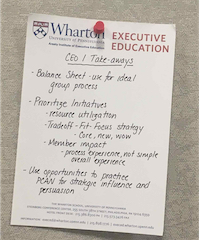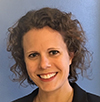5 minutes
A CEO Institute attendee’s 5 steps for ensuring your professional development experience informs your work going forward
You’ve just returned to your office from a learning experience, full of excitement for what is to come. Your notebook is filled with pages of notes, take-aways and ideas you’d like to put into action. But when you open your email, you find yourself torn between moving back into your daily routine and pushing forward based on all of your new knowledge and experiences. How do you balance these two paths?
My recent experience attending CEO Institute I: Strategic Planning at The Wharton School, University of Pennsylvania, in Philadelphia, was just as described above. Every day of the event, I returned to my room filled with new knowledge, ideas and contacts that I was so excited to bring back to my work/office.
When I got back to CUES in Madison, I couldn’t express how impactful the week had been for me and all that I had experienced. I put my materials on my desk and for a couple of days they inched farther and farther from my line of sight. On my third day back, I realized I was going to have to take action to truly apply my experience at CEO Institute to my work.
Indeed, learning is not an event; it’s a process. We need to continue learning when we get back to our offices by engaging others and moving forward with our ideas. Here are five recommendations for how you can do this—and what I did for each.
1. Block Your Time
One of the best things I do before I leave for an event is block time on my calendar for my return to review my notes, gather my thoughts and even come up with an implementation plan for my learning if I don’t already have one.
Before leaving for CEO Institute, I blocked two hours on my calendar for the Monday I’d be back. I labeled it as “catch up” and did use the time that day to look over my notes and finalize my list of take-ways … and caught up on emails.
2. Identify Your Top Take-Aways
I also suggest making note of two or three take-aways you got from a learning event. If you attend a multi-day event, you may want to do this at the end each day, then narrow down your list of daily take-aways to the two or three from the whole event that you’ll implement right away when return. This is best done while the content is fresh, but you can continue to add to it as you recall additional information. Your full take-away list should live near where you work—such as on a post-it on top of the papers on your desk or tacked to your wall where you (and your team members) can see it.

Throughout my week at CEO Institute, the faculty allowed us to connect in small groups each morning to talk about our take-aways from the previous day. This helped me to refine my list and generated about 14 big take-aways/actions by the time I left. I used this list to identify the top one to two that I wanted to try to implement into my work right away. (See photo at right.)
3. Look at Your Notes
This may seem simple, but I’ve seen people (and have been guilty of this practice myself) return from an event, only to put their notes on a shelf or in a drawer. Aside from the take-aways you identified, your notes likely include great insights. Review them when you return and pull out any additional notes that you want to share with others or think have the potential to help you down the road. Add any additional take-aways to your list that you think of over time but be realistic about what can be accomplished and don’t overwhelm yourself with too many new things. Ask yourself if everything on your take-away list is relevant.
I did this on the Monday morning of my return to the office, during my scheduled “catch-up” time. CEO Institute is a full week of learning, so it was really helpful to take a few mental days off and then look at my notes with fresh eyes.
4. Maintain the Human Connections You Made
Many of us say that the contacts we make while away at a learning event is incredibly valuable. Continue to build the relationships you began on site by reaching out to those contacts once you’ve returned home. For example, you could touch base about ideas you plan to move forward with or ask questions to clarify any points in your notes. If the event or its sponsor has an online community (like CUES Net), use that as a starting point. Maybe start a discussion to see what others are doing post-event. If you work better with a more formal process, you can establish an accountability partner with someone you met at the event and check in with each other at regular intervals to keep things moving forward.
Throughout the week, I had a chance to connect with some wonderful people. When I returned to the office, I sent emails to a few of them to re-connect, follow up on a discussion we had, ask a question or just say hi.
5. Talk to Your Colleagues
Another great way to ensure your ideas and excitement continue is by connecting with your colleagues. Present your learnings to your team, discuss your ideas and take-aways, and get others involved in trying new things—remember, you don’t have to do everything. Pass ideas along to your peers and engage your high potentials (those that have the ability and could benefit from developing their skillset) in projects to see if your initial thoughts have potential. The more you pull others in and get them involved, the greater chance your ideas or initiatives will move forward because it doesn’t all rest on you.
When I returned from CEO Institute, I sat down and talked with my boss for an hour about some of the highlights from the week—my take-aways, questions I had and new ideas. This conversation helped refine my take-away list and the items I want to implement. I even sat down with a few other colleagues to share some ideas or insights that I thought they may appreciate.
Returning from learning to actually use what you’ve learned requires action on your part. You cannot simply come back from a learning experience and expect things to fall into place. Take some intentional actions to connect with others, block time on your calendar and give yourself permission to spend time reflecting, as it will have great payoff in the long run.
Jennifer Stangl is CUES’ director of professional development.






